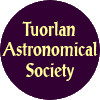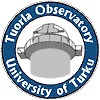Planet
A large body that orbits a star. Planets do not emit light on their
own (but reflect light of their star). A planet may consist of rock
and metals, like the inner planets of Solar System, or or gases and
liqiuds, like the gas giants of Solar System. There is a class of
so called brown dwarf stars in the border area of biggest gas giant
planets and smallest stars that can not clearly be classified as
either.
The IAU members gathered at the 2006 General Assembly agreed that a
"planet" is defined as a celestial body that (a) is in orbit around the
Sun, (b) has sufficient mass for its self-gravity to overcome rigid body
forces so that it assumes a hydrostatic equilibrium (nearly round) shape,
and (c) has cleared the neighbourhood around its orbit.
It should be noted that point (c) should not be taken literally as e.g.
the Moon exists on the orbit of the Earth. The spirit of point (c) is that
a planet either controls its orbit or can clear it. The Earth totally
dominates its orbit and, hence, that of the Moon. Neptune, on the other
hand, can sling Pluto out of the solar system - or at least alter its
orbit considerably - should they ever come very close to each other. Pluto
is so small in comparison that the change in Neptune's orbit would be
infinitesimal.




























































